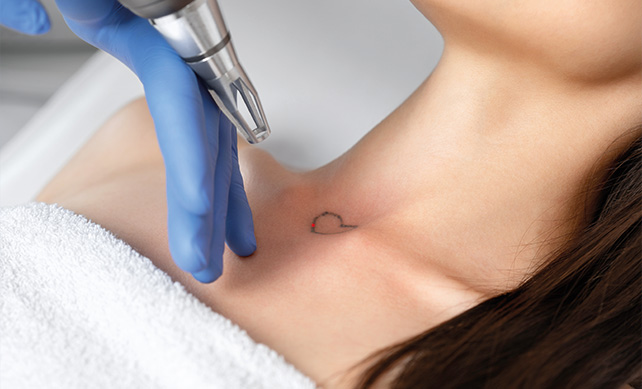Laser tattoo removal is one of the most popular and effective methods for getting rid of unwanted tattoos. Whether you want to completely erase a tattoo or just lighten it for a cover-up, understanding how long the fading process takes can help manage your expectations. This guide explores the key factors that influence how long it takes for a tattoo to fade after undergoing Laser Tattoo Removal Dubai.
Understanding the Laser Tattoo Removal Process
Laser tattoo removal uses high-intensity light to break down the ink particles embedded in the skin. The laser targets the pigment in the tattoo and causes it to break into smaller fragments, which are then absorbed and processed by the body's immune system. The tattoo may appear lighter after each session, but it takes multiple treatments to completely fade a tattoo.
Factors That Affect the Fading Process
Several factors influence how long it will take for your tattoo to fade completely. Each individual is different, and these factors can make a significant difference in the speed and success of your tattoo removal process.
Tattoo Color
The color of the tattoo ink is one of the most significant factors when it comes to how long it will take to fade. Darker colors, such as black and dark blue, are generally easier to break down with laser treatment. Lighter colors, like yellow and green, can be more challenging and may take longer to fade. Some pigments, like white and neon colors, can be more resistant to laser removal.
Tattoo Size and Density
The size of your tattoo and how densely packed the ink is will impact the number of treatments needed and how quickly the tattoo fades. Larger tattoos or those with heavy saturation require more time and multiple laser sessions to break down the ink effectively. Smaller tattoos with lighter ink may require fewer treatments and fade faster.
Depth of the Ink
The depth at which the ink was injected into the skin can also affect the fading process. Tattoos that are deeper in the dermis layer can take longer to fade because the laser needs to penetrate deeper layers of skin to break down the ink. Shallow tattoos, on the other hand, may fade faster as the ink is closer to the surface.
Skin Type
The condition and type of your skin can influence how quickly your tattoo fades. People with fair skin may experience quicker fading, while individuals with darker skin tones might need more sessions to see visible results. Additionally, if your skin has scarring or other irregularities, it can impact the effectiveness of the treatment.
Tattoo Age
Older tattoos tend to fade faster during laser removal than newer tattoos. This is because the ink in older tattoos has already settled and may have already begun to fade naturally. Newer tattoos, on the other hand, may take longer to fade because the ink has been freshly deposited into the skin.
How Many Laser Sessions Are Needed?
Typically, you will need several sessions to see significant fading in your tattoo. The number of treatments depends on the factors mentioned above. On average, most people need between 5 to 10 sessions, spaced 6 to 8 weeks apart, to achieve noticeable fading. Each session helps to break down the ink particles further, with the body continuing to process and eliminate the ink over time.

What to Expect After Each Laser Session?
After each session, you will likely notice some fading, though it may not be dramatic. The ink will gradually break down and be absorbed by your body’s immune system. The fading process can take several weeks after each session, as the body needs time to flush out the broken-down ink particles. It's important to be patient and allow time for the tattoo to fully fade.
How Long Does It Take for a Tattoo to Fade?
The timeline for complete tattoo fading varies greatly depending on the factors discussed. On average, it may take anywhere from 6 months to a year or more to see significant fading of your tattoo. In some cases, tattoos can be completely removed, while others may only fade to a point where they are no longer visible enough to be a concern. This timeline depends on the tattoo's characteristics, your skin's healing process, and the number of sessions required.
Can You Speed Up the Fading Process?
While Laser Tattoo Removal in Dubai is the most effective method for fading a tattoo, there are no shortcuts to speeding up the process. Consistency is key. Following the recommended number of sessions and giving your skin enough time to heal between sessions will ensure the best results. Additionally, taking care of your skin throughout the treatment process, such as staying hydrated and protecting your skin from excessive sun exposure, can contribute to optimal results.
Conclusion
Laser tattoo removal is an effective way to fade or completely remove unwanted tattoos, but the process takes time. Factors like tattoo color, size, ink depth, skin type, and tattoo age all play a role in determining how long it will take for your tattoo to fade. While multiple sessions are typically required, patience and consistency are key to achieving the best results. By understanding these factors and managing your expectations, you can make informed decisions about your tattoo removal journey and achieve the desired outcome.





.png)
Comments